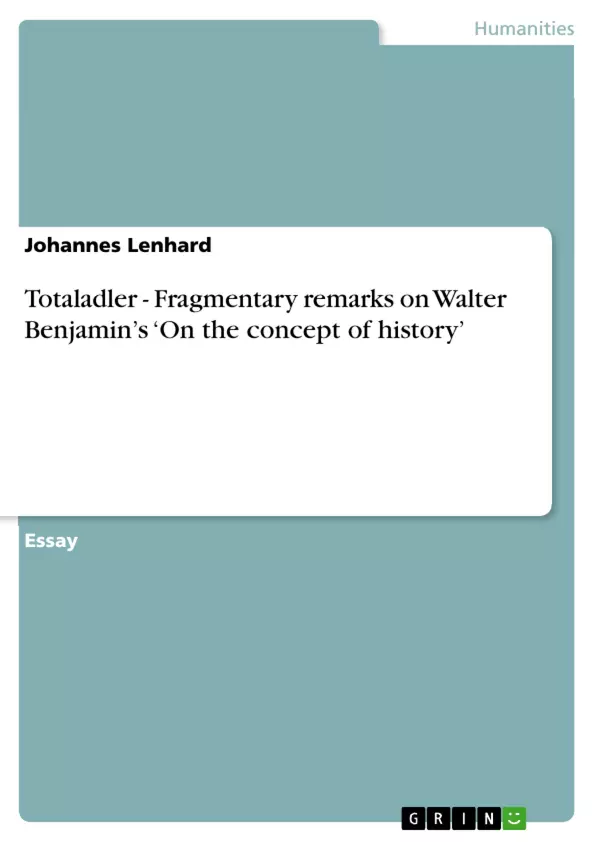Today, Benjamin’s ‘angel of history’, his ‘angelus novus’ has to fight an even greater danger than the storm of progress that was characteristic for Benjamin’s time. Today’s force is more material, more powerful and perhaps even more catastrophic but just as total and real as was the storm blowing away the angel sixty years ago. The angel has finally found a counterpart that fights him, something that he can touch. But does this make it easier for the angel, the embodiment of history, “to stay, awaken the dead, make whole what has been smashed” (392) or are we still to await the coming of a messiah that can win over the antichrist (391)?
Inhaltsverzeichnis (Table of Contents)
- Introduction
- The Total Eagle
- The Angel's Challenge
- Benjamin's Ninth Thesis Revisited
- The Theological Dimension
- Beyond the Western Lens
- Change or Standstill?
Zielsetzung und Themenschwerpunkte (Objectives and Key Themes)
This paper examines Walter Benjamin's “On the Concept of History” through the lens of Jonathan Meese’s artistic vision. It aims to analyze the contemporary relevance of Benjamin’s work, particularly his concept of the Angel of History, in the context of global financial capitalism, American power, and contemporary historical events. Key themes explored include:- The Angel of History and the "Totaladler" (Total Eagle)
- Counter-progress and the Destruction of History
- The Role of Theology in Benjamin's Thought
- The Applicability of Benjamin's Theories to Non-Western Contexts
- The Tension Between Revolutionary Change and Standstill in Benjamin's Work
Zusammenfassung der Kapitel (Chapter Summaries)
The paper begins by introducing Jonathan Meese's concept of the "Totaladler" as a contemporary force opposing the Angel of History. It argues that this force, embodied by American financial capitalism, poses a greater threat to history than the "storm of progress" Benjamin envisioned. The second section explores the implications of this "counter-progress" for Benjamin's understanding of history. It suggests that this force could not only "blow away" history, but also destroy it, potentially replacing historical consciousness with a new, self-created narrative. The third chapter revisits Benjamin's ninth thesis, arguing that its relevance remains strong in a world dominated by "counter-progress." The author contends that the narrative of progress remains unchallenged, preventing people from recognizing the fragmented nature of the past and the need for its redemption. The fourth section delves into the theological aspects of Benjamin's work, examining the marriage of historical materialism and Jewish theology. The author explores the potential limitations of this approach for contemporary readers, particularly in a secularized world. The fifth chapter shifts the perspective from a Western lens to a global one, considering the applicability of Benjamin's ideas to non-Western contexts. The author suggests that the "Arab Spring" might represent a situation where Benjamin's concept of the Angel of History, with its theological implications, might find a more fertile ground. The final section delves into the question of whether Benjamin advocates for revolutionary change or a kind of standstill. The author examines the tension between these perspectives in Benjamin's work, emphasizing the importance of "standstills" and "constellations" in his thought.Schlüsselwörter (Keywords)
The central keywords of this paper encompass the intersection of Walter Benjamin’s theories, Jonathan Meese’s artistic vision, and the contemporary world. These include:- Angel of History
- Totaladler (Total Eagle)
- Counter-progress
- Historical Materialism
- Jewish Theology
- Global Financial Capitalism
- Arab Spring
- Revolution
- Standstill
- Constellation
Frequently Asked Questions
What is Walter Benjamin's "Angel of History"?
The Angel of History is a concept based on a painting by Paul Klee, representing history as a series of catastrophes that the angel watches while being blown into the future by the "storm of progress."
What is the "Totaladler" in this context?
The "Totaladler" (Total Eagle) is a concept by artist Jonathan Meese, used in this paper to represent the material and powerful force of modern global financial capitalism that opposes the Angel of History.
How does Benjamin combine materialism and theology?
Benjamin's work "On the Concept of History" attempts to marry historical materialism with Jewish theology to find a revolutionary way to "awaken the dead" and redeem the past.
What is the significance of the "Arab Spring" in this analysis?
The author suggests that the Arab Spring represents a contemporary context where Benjamin's theological and revolutionary ideas might find new applicability outside of a Western lens.
Does Benjamin advocate for progress or standstill?
Benjamin is critical of the traditional notion of progress; he emphasizes the importance of "standstills" and "constellations" as moments where revolutionary change can occur.
- Quote paper
- Johannes Lenhard (Author), 2012, Totaladler - Fragmentary remarks on Walter Benjamin’s ‘On the concept of history’, Munich, GRIN Verlag, https://www.grin.com/document/193221



